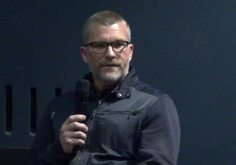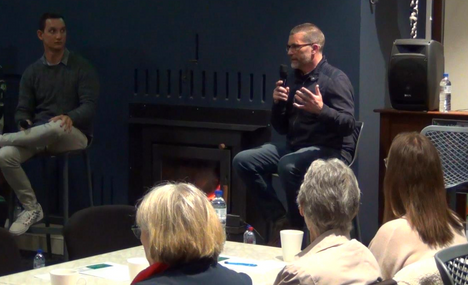Paperbark Conversations - Sleep
- paperbarkwp
- Oct 20, 2022
- 8 min read
Updated: Oct 22, 2022
Busselton Golf Club, 10 October 2022

It was so good to finally be able to hold our first Paperbark Conversations event for nearly 12 months.
A huge thankyou to all the practitioners who put their hands up to be part of what turned out to be a lovely evening of sharing knowledge and life experiences with the audience and thanks also to our community who put their faith in us to be able to deliver a night full of information, connection and learning.
Plus a big heartfelt thankyou to the Busselton Golf Club for being a wonderful community mental health supporter and having a fabulous venue that they allowed us to use for the evening. If you are looking for somewhere different to have a coffee and cake, then please visit their lovely Clubhouse Café. It is open to the general public.
It’s always great to be in the company of people who are interested in taking charge of their own health and wellbeing, and Monday night was no exception. This commitment was matched by the wonderful practitioners, who volunteered their time to come along and be a part of our Q & A as they too have a passion for sharing what they know with the community to help them make informed choices for their own and their families' health and wellbeing journey.
Our topic was SLEEP, and gosh there was so much to know and take in. Even though we only touched the surface of what is a huge subject it was enough to inform our audience of the steps that they could take from there to make changes to their own sleep situation.
Panel and MC

Our panellists for the evening were Victoria Martin (naturopath), Dr Matty Moore (GP), Teano Nguyen-Verdenet (osteopath) and Pauline Carr (senior sleep technologist), and our MC for the evening was Genevieve Morrissey (counsellor and Coordinator of the Paperbark Wellness Project). More on our panellists can be found below.
What constitutes a good night's sleep?
Duration for adults aged 26 - 64+
Recommended; 7 to 9 hours
May be appropriate: 6 to 10 hours
For a full age range table, visit: How much sleep do you need?
Sleep is the bedrock or foundation of good health. It is where the amazingly complex systems that govern our bodies can do the recovery, reloading and rejuvenating that enable us to function as we should during our waking hours.
Why Do We Sleep? Watch this excellent TED Talk from Russell Foster, Circadian Neuroscientist at the University of Oxford.
See this Good Sleep Hygiene Information Sheet.
The most common causes of insomnia/poor-quality sleep
Technology
This, by a huge margin, is the leading cause of sleep disruption where there is no underlying physical or psychological condition. This is one area that we really need to take much more seriously as the cost mentally and physically is enormous and yet we keep on dismissing the inconvenient truth of it.
Victoria Martin recommends to her patients that every so often they take a “camping reset weekend” where they pretend that they don’t have access to technology, just as if they were camping in the outback.
Victoria recommends that you look up Professor Matthew Walker for further information on sleep, blue light and circadian rhythms. He is a Professor of Neuroscience and Psychology at the University of California, Berkeley, and Founder and Director of the Center for Human Sleep Science.
His website: The Sleep Diplomat
His book: Why We Sleep
She also recommends Dr Michael Mosley's book Fast Asleep.
Children & teenagers and technology
We only lightly touched on this topic as it is a subject that deserves its very own Paperbark Conversation.
"Most of the population lack energy when they don’t get enough sleep. Paradoxically younger children can exhibit symptoms of attention deficit hyperactivity disorder (ADHD), becoming excitable, hyperactive, disagreeable and engaging in extreme behaviours like tantrums or aggression. Unfortunately it’s not uncommon for a child to be diagnosed with ADHD, when the real culprit is chronic sleep deprivation," according to Lisa Maltman, the Founder and Owner of the Australian website The Sleep Connection, which is all about improving sleep in children and teenagers.
See also: How Sleep Deprivation Looks a Lot Like ADHD by Vatsal Thakkar MD.
Breathing, snoring & nasal congestion
Are you a mouth or nose breather? Have you ever felt that you are not getting enough oxygen or air in your lungs? There is a lot of information and research now that would suggest that humans are switching to being mouth breathers instead of using our noses, and there are health consequences for that, which include nasal congestion, snoring and brain fog. Grab yourself a copy of James Nestor's book (link below) plus get online and do some research yourself if you think that this could apply to you.
Breath: The New Science of a Lost Art by James Nestor
This wonderfully entertaining, fact-filled book explores how the human species has lost the ability to breathe properly over the past several hundred thousand years and is now suffering from a laundry list of maladies — snoring, sleep apnoea, asthma, autoimmune disease — because of it.
On the topic of nasal congestion, sleep and snoring, we handed out 20x3 lots of nasal strips to try as some people have found them to be very beneficial for making their airways clearer during sleep, reducing snoring and generally improving the quality of their sleep, particularly if they don't have any other co-morbidities that are contributing to sleep loss. Here's hoping the strips we handed out made a difference.
Here is the link to the small Australian family company that makes these top-quality nasal strips and others in different shapes and sizes at a very affordable price: Sleep Quiet. See also this video by the company, which explains why they have made these strips: Video by Sleep Quiet founder.
Mental health
For many mental health issues that disturb sleep, such as anxiety, depression, PTSD and bipolar, it really can be a double-edged sword. These conditions can cause sleep disturbances, and sleep disturbances will exacerbate the condition.
Aside from the issues above, life in general at the moment is pretty full-on for most people, let alone if you are experiencing any sort of emotional/psychological stress in your relationships, family, work environments or social structure. Even though we sometimes rate these stresses as manageable, they will eat away at your ability to sleep well and the knock-on effect of that is that this will be eroding your body's capacity to produce the chemistry that helps you deal with not only stress but the ordinary job of keeping you functionally alive and going.
Don't fall into the trap of underestimating or ignoring just how important it is to get the quality and quantity of your sleep right, no matter what your stress levels are or your mental health is like. It might be inconvenient or take some effort now, but the consequences further down the track can be very serious indeed.
As with all the categories discussed, there is no one size fits all when it comes to our emotional and mental health, so it is very important to find a GP and other holistic health professionals to help you navigate your way, such as naturopaths, osteopaths, counsellors, psychologists, kinesiologists, acupuncturists, breath and body workers, and this region is blessed with many wonderful highly skilled practitioners.
Here is a good online resource that has information regarding sleep and mental health:
Chronic pain and chronic insomnia
There is some very encouraging data and mounting evidence around the use of medicinal cannabis and CBD oil to help deal with sleep disorders, chronic pain, chronic insomnia, anxiety and depression.
Dr Matty Moore recommends this link for information on medicinal cannabis: Honahlee.
Teano Nguyen-Verdenet recommends these links on pain and sleep: Painhealth and Pain Management Network, and if you feel like a scholarly read then here are a couple of very informative studies to take in: The association of sleep and pain (The National Library of Medicine) and Sleep and Pain (Clinical Journal of Pain).
Hormones
Out-of-balance hormones are at the top of the list of things that can cause disruption to our sleep cycles and rhythms, and this applies to adults and children, men and women. Poor sleep quality and short sleep duration can hinder not only hormone levels, but how your hormones are produced and how they interact with each other.
Even though sometimes there seems to be no obvious correlation between what you are doing and eating, etc. out-of-balance hormones may be playing a part behind the scenes. There are many hormones that play a role in your sleep: cortisol, progesterone, melatonin, vitamin D (yes, it's a hormone, not a vitamin), oestrogen, testosterone, insulin, leptin, ghrelin, thyroid and growth hormones.
Victoria Martin recommends the following resources:
For hormone health:
Lara Briden, in particular her book Hormone Repair Manual.
Aviva Romm and her book Hormone Intelligence.
For thyroid health:
Izabella Wentz, the Thyroid Pharmacist, and her book Root Cause.
Getting older
Even though we didn’t spend much time on this, it was woven into the discussion at different points.
Further to Monday night's conversation, here is a list of things to think about:
You still need between 7 and 9 hours of sleep
Balanced hormones make a difference; consider vitamin D, cortisol and melatonin
Increase your physical activity
Good, enjoyable social stimulation and activity can make a big difference
24% of people aged between 65 and 84 report being diagnosed with four or more health conditions and are therefore likely to have poorer sleep. Perhaps this is one of the times when having an integrated holistic team approach to your health would make a big difference
Medication can disturb your sleep. Learn more about your medication and discuss this with your doctor. Sometimes taking medicines at a different time can make a difference.
A good online resource that has information regarding ageing and sleep is The Sleep Health Foundation.
Also check out Medication and Sleep with Dr Russell Foster, Circadian Neuroscientist at the University of Oxford. At 4.20 mins he discusses anti-hypertensive medication.
And have a read of this newly published study: Sleeping under 5 hours when over 50 adds to health risks, study warns (Washington Post published 19/10/2022).

Sleep apnoea
Sleep apnoea is a potentially serious sleep disorder in which breathing starts and stops during sleep. The body’s response to these pauses results in small awakenings or arousals causing disruption to sleep. Common symptoms include snoring, choking, gasping, a dry sore throat/mouth and symptoms of sleepiness and fatigue during the day. 1 in 20 Australians are affected by sleep apnoea. Untreated sleep apnoea prevents your body from getting the benefits of proper sleep. Many people are unaware that they have sleep apnoea.
Sleep apnoea can often be the last thing your GP or healthcare professional looks for when you present with chronic tiredness and a lack of the common symptoms. Do your research, and if you think that you tick a few boxes for sleep apnoea ask your GP to refer you for a sleep test with fully trained and qualified sleep therapists with the clinical knowledge and compassion to help you find the sleep solution that works for you.
Because sleep is so important, the interruption caused by sleep apnoea can have a devastating effect on your health and well-being. Left untreated, sleep apnoea can cause all of the following issues and more:
Waking up feeling tired and exhausted
Snoring and restless sleep
Relationship stress, often caused when the patient’s snoring interrupts a partner’s (or the whole household’s) sleep
Heart attacks and strokes
Chronic high blood pressure
Car accidents – sleepy people have slower reaction times and may fall asleep at the wheel
Clinical depression – 20% to 40% of sleep apnoea sufferers display depression symptoms.
The good news is that sleep apnoea is an easily treated sleep disorder. The gold standard treatment of this disorder is Continuous Positive Airway Pressure (CPAP) therapy, particularly for moderately severe to severe sleep apnoea. Alternative treatment options include surgery, a dental device, or more simple measures including weight loss or positional therapy.
If you are someone who already has a diagnosed sleep apnoea issue but are having trouble using your CPAP machine or other treatment options, consult someone who is a fully trained and qualified sleep therapist as their experience in treating these issues can mean the difference between achieving success with your treatment option and giving up because you don't feel like you are getting any real benefit from it.

How to contact our panellists and MC
Dr Matty Moore: Mode Healthcare and Dr Matt Moore
Teano Nguyen-Verdenet: Mana Health Clinic
Victoria Martin: Victoria Martin Naturopathics
Pauline Carr: Sleep and Snore Solutions
MC Genevieve Morrissey: WholeHearted You Counselling Busselton
Other links that we feel could be helpful
Dr Rangan Chatterjee is a British GP with 20 years' experience, who is an avid podcaster. He interviews leading health professionals from around the world.
Here are links to his interviews with:
James Nestor, author of Breath: The New Science of a Lost Art
Patrick McKeown (CEO of The Buteyko Clinic and oxygenadvantage.com) on the importance of nose breathing
Professor Matthew Walker (Professor of Neuroscience and Psychology at the University of California, Berkeley, and Founder and Director of the Center for Human Sleep Science)
Russell Foster, Oxford Neuroscientist on how poor sleep leads to chronic disease
Also watch the video Q&As on James Nestor's website.
Dr Matty Moore also recommends Dr Neil Stanley's book: How to Sleep Well.
Gallery



























Comments